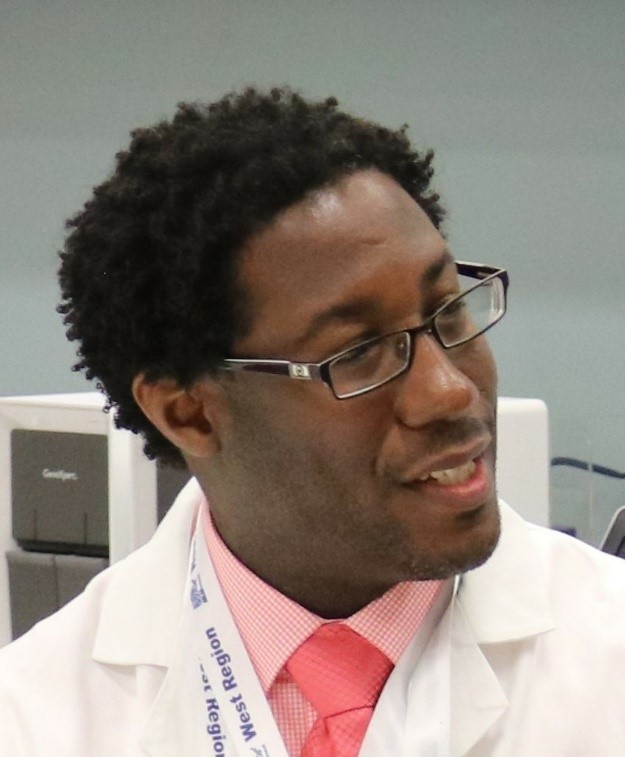JHSPH Alumni Profiles
Dr. William Glover
 Dr. William Glover graduated from the Johns Hopkins Bloomberg School of Public Health, Department of Molecular Microbiology and Immunology in 2010. He completed his dissertation on the molecular and genetic basis of L-form bacteria formation in the laboratory of Dr. Ying Zhang. Prior to beginning his PhD program at JHSPH, Dr. Glover received his BS degrees in Microbiology and Clinical Laboratory Sciences from the University of Iowa and completed a CDC Emerging Infectious Disease Fellowship at the North Carolina State Public Health Laboratory. Following his PhD, Dr. Glover then completed an ASM Committee on Postdoctoral Programs (CPEP) approved Clinical and Public Health Microbiology fellowship at the University of Washington, Seattle, after which he accepted a position as Lead Microbiologist at the Washington State Public Health Laboratories where he continues to work today. Dr. Glover is currently the Director of Science and Technology at the Washington State Public Health Laboratory and oversees clinical testing services at the laboratories.
Dr. William Glover graduated from the Johns Hopkins Bloomberg School of Public Health, Department of Molecular Microbiology and Immunology in 2010. He completed his dissertation on the molecular and genetic basis of L-form bacteria formation in the laboratory of Dr. Ying Zhang. Prior to beginning his PhD program at JHSPH, Dr. Glover received his BS degrees in Microbiology and Clinical Laboratory Sciences from the University of Iowa and completed a CDC Emerging Infectious Disease Fellowship at the North Carolina State Public Health Laboratory. Following his PhD, Dr. Glover then completed an ASM Committee on Postdoctoral Programs (CPEP) approved Clinical and Public Health Microbiology fellowship at the University of Washington, Seattle, after which he accepted a position as Lead Microbiologist at the Washington State Public Health Laboratories where he continues to work today. Dr. Glover is currently the Director of Science and Technology at the Washington State Public Health Laboratory and oversees clinical testing services at the laboratories.
Dr. Glover chose to pursue a career as a public health microbiologist due to his hope to bridge his interest in studying disease-causing microorganisms and desire to serve populations of people. He was initially exposed to public health microbiology prior to beginning graduate school during his Emerging Infectious Disease Fellowship at the North Carolina State Public Health Laboratory and decided to continue on this career path after completing his PhD at JHSPH.
To transition from academic research to clinical lab work, Dr. Glover decided to apply for clinical and public health microbiology postdoctoral fellowships. He was ultimately accepted to the University of Washington, Seattle program, which involved rigorous coursework in microbiology as well as rotations at local hospitals and the state public health laboratory. This was the ideal transition because the two-year program is designed to be a training opportunity that simultaneously allows fellows to gain hands-on experience in the field and prepares them for directorship at a clinical or public health laboratory. The hardest hurdle for most graduate students to adjust to in clinical and public health laboratories is being in a heavily regulated environment compared to level of freedom in academia.
The citizenship/permanent residency requirements for the types of fellowships Dr. Glover completed differ on an institute-by-institute basis. The requirements for positions at public health laboratories also depend upon the specific state and agency.
Dr. Glover highly suggests getting as much exposure to clinical laboratory science as possible, as the work process and priorities do significantly differ from traditional academic basic science research. To accomplish this, he suggests pursuing shadowing/internship opportunities specifically at clinical samples-focused laboratories, speaking with other professionals in the field, attending related conferences, and independently researching the field. For those without prior experience in clinical lab work but hoping to make the transition, Dr. Glover again highly recommends looking into fellowship programs at institutions such as the CDC, APHL, or ASM that are designed to train early-career professionals.
The work environment at a public health laboratory is highly variable depending on the immediate needs of the local population, ongoing outbreaks or epidemics, etc., which makes the day-to-day work both exciting and very fulfilling. In addition to a comprehensive background in microbiology and laboratory techniques/assays, a position as director of a public health laboratory especially requires a strong set of interpersonal, administrative, and leadership skills, as the primary responsibility is to oversee the activities of a dynamic laboratory staff in the analysis and testing of patient samples. Laboratory directors are also responsible for managing the financial aspects of running a complex laboratory system. As a public health authority, laboratory directors are finally also expected to effectively and accurately communicate information to the media and local community.
Educational requirements for public health laboratory directors differ based upon the specific state or county, however most have advanced degrees in a related field. Certification is required to become a public health lab director however, and this can be acquired through either completing a specialized fellowship in clinical and public health microbiology or gaining experience while working at least three years at a public health laboratory followed by taking and passing a board certification exam. In addition to the certification, individuals applying for a position as a laboratory director also need to have demonstrated experience in management and extensive technical knowledge of regulations.
Details matter and always do your best even when you feel no one is paying attention. You will be surprised who is paying attention and who has taken note of your work ethic and quality of work produced. This opens doors to advancement.
Thank you again to Dr. William Glover for his time in conducting this informational interview.
This interview was conducted by Jane Yeh, a PhD candidate in the Department of Molecular Microbiology and Immunology, in collaboration with the Professional Development and Careers Office at the Johns Hopkins School of Medicine.
Current students: if you are interested in connecting with Dr. Powell or other alumni for your own career exploration, please contact: phd_recruit@jhmi.edu.
Alumni: If you are willing to be contacted by a current student for an informational interview to have a profile made about your career path, please contact: phd_recruit@jhmi.edu.
